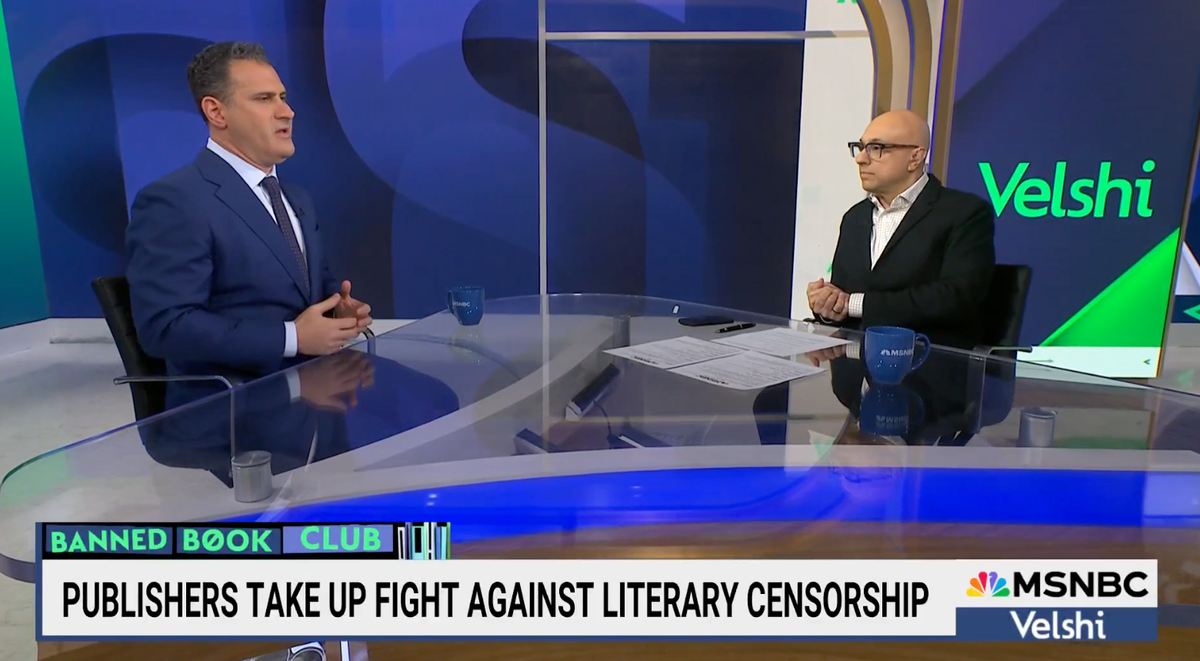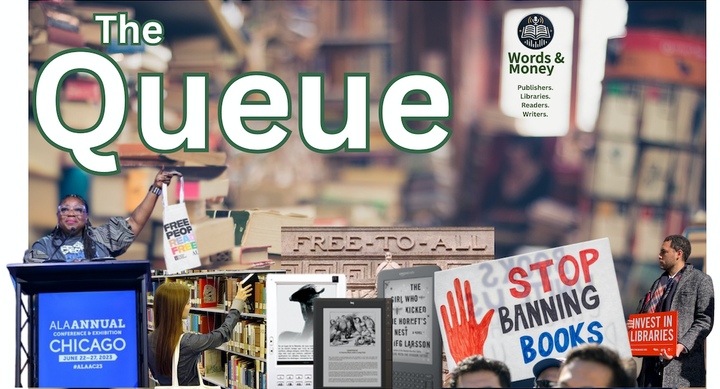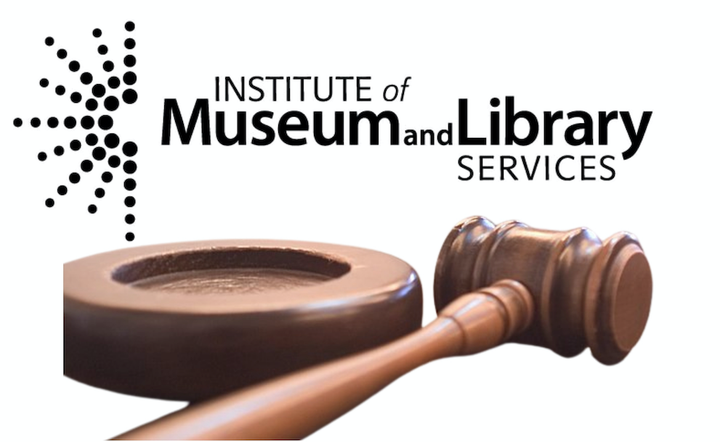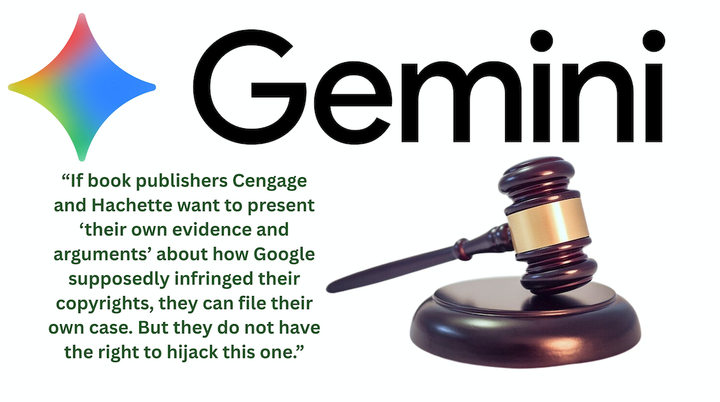The Queue: Library News for the Week Ending May 2, 2025
Among the week's headlines: The IMLS gets a stay of execution; Macmillan CEO John Yaged talks book bans; the Book Industry Study Group hosted a strong annual conference program in New York; and author Chris Barton shares a no-nonsense op-ed against a Texas book banning bill.

Librarians at last year’s ALA Annual conference in San Diego had a chance to hear firsthand from journalist Ali Velshi, who has since 2023 been highlighting the issue of book banning by hosting authors on The Velshi Banned Book Club during his weekend show on MSNBC.
Velshi has highlighted well over a 100 books and authors since the club’s inception. And on last week’s episode he brought on a special guest—Macmillan CEO John Yaged, the publisher of Velshi’s 2024 memoir Small Acts of Courage: A Legacy of Endurance and the Fight for Democracy.
Yaged’s short appearance was significant. Among the Big Five, Penguin Random House has been leading the publishing community’s charge against book banning, especially in the courts. But is important to see the CEO of another Big Five publisher on TV visibly defending the freedom to read. Behind a chyron reading “Publishers Take Up the Fight Against Literary Censorship,” Yaged expressed support for the IMLS (Macmillan was one of the publishers to sign a letter to Congress protesting the administration’s bid to destroy the agency) and spoke briefly about why publishers must step up to defend libraries and the freedom to read in court.
“It becomes existential,” Yaged told Velshi when asked about the publishers’ legal strategy. “And our authors are, you know, encouraging us to do it. And it doesn't take much encouragement. It needs to be done.”
Mark those words: It needs to be done. After four exhausting years of a right-wing political assault on libraries and the freedom to read, advocates say it is essential that publishers—especially the well-resourced Big Five—remain committed and united in defending libraries and the freedom to read, whether in court, in legislatures, in the media, in the marketplace, or by writing checks to support the groups doing the hard work on the ground (see below).
Making Headlines...
As we reported here at Words & Money, a federal judge on May 1 issued a temporary restraining order (TRO) halting the Trump Administration's plans to destroy the agency. In a release, ALA officials called the decision "a win for America's libraries and the millions of Americans who rely on them." Of course, there is much more to come as the litigation in the ALA's case continues, and in a similar case filed by 21 states in federal court in Rhode Island, where a federal judge is expected to rule at any moment on whether to issue a preliminary injunction blocking the destruction of IMLS and six other agencies targeted by Trump in a March 14 executive order.
Meanwhile, the Trump administration's attacks on the free press ramped up today with a very dictator-style executive order targeting public media, titled: Ending Taxpayer Subsidization of Biased Media. CNN reports that the order instructs the Corporation for Public Broadcasting to "terminate direct funding for National Public Radio and the Public Broadcasting Service." There's a more than few problems, however, including that the CPB is set up as a private entity "that is supposed to be protected from government interference." In a statement, PBS CEO Paula Kerger called the order "blatantly unlawful."
The Conversation has a good and timely piece on how Trump is importing his media strategy from Hungarian strongman Viktor Orbán.
Good news from North Dakota: The North Dakota Monitor reports that on April 25 the state senate, as expected, upheld governor Kelly Armstrong’s blistering veto of the state’s controversial library obscenity bill, SB 2307. The article notes that the SB 2307 override vote actually got less support than when the bill passed.
In a statement, grassroots Advocacy group Right to Read North Dakota thanked the governor and the lawmakers who opposed SB 2307, which, among its provisions, would have exposed librarians and educators in the state to legal jeopardy for not censoring books. However, the group also sounded a note of caution.
“While the bill has been defeated, we cannot overlook the damage caused by the rhetoric surrounding SB 2307. Throughout this debate, librarians and educators—trusted public servants across our state—have faced an onslaught of misinformation, vilification, and personal attacks. This hostile environment has caused real harm, and it must come to an end,” a RTRND statement reads. “The emotional and professional toll of SB 2307 on library workers across North Dakota is significant. We must now stand by them as they continue their vital work, free from the fear of criminalization or political retaliation.”
Meanwhile, one organization that has consistently shown up for libraries in defense of the freedom to read (as well as on many other issues) is library political action committee EveryLibrary. And, in a post this week, the organization detailed its role in helping Right to Read North Dakota stand up its legislative fight against SB 2307. “This campaign is a powerful example of how dedicated local advocates, supported by the right tools and guidance, can stand up to powerful forces and win,” the post notes.
In Alabama, Al.com reports on “a fiery and emotional” city council meeting over the Fairhope Public Library board’s decision not to move two books from the teen section in the library. “Those two books were Sold about sexual slavery in India, and Grown, which is about sexual exploitation. Library board members said neither book, in its full context, contains obscenity as defined through federal law, nor do they violate community standards on what can be displayed inside the Fairhope Public Library,” the article notes, adding that the three-hour comment period filled the city council chamber and stretched into an overflow room.
The hearing comes after the Alabama Public Library Service board in March temporarily suspended $42,000 in state funding for the Fairhope Public Library, claiming the library is in violation of the APLS’s new rules regarding the shelving of allegedly inappropriate content. However, within days, an online fundraiser organized by the anti-censorship group Read Freely Alabama (with help from EveryLibrary) raised over $46,000 to supplant the loss in state funding.
The Alabama Political Reporter also has a story on the Fairhope city council meeting. “While both sides were present, 75% of the 40 speakers signaled support for the library’s decisions, despite the potential loss of state funding,” the article states. Still, several residents critical of the library "threatened to keep council members from being reelected if they do not act to make the library move allegedly inappropriate books. "'Your actions as leaders of our city have shown clearly that you are not on board with the Trump agenda,'" commented conservative attorney Brian Dasinger.
In Arkansas, Tess Vrbin at the Arkansas Advocate reports that the Crawford County Public Library System will be stuck paying the legal fees of three residents who successfully sued the library in 2023 over the segregation of children’s books with LGBTQ+ themes. “The Crawford County Quorum Court voted unanimously Monday night at a special meeting to accept the library governing board’s offer to pay nearly $113,000, which U.S. District Judge Timothy Brooks declared the defendants in the suit must pay,” Vrbin reports. “The quorum court and the library board had already squabbled for months over whether the county or the library was responsible for the payment… On Wednesday, the library board voted 3-1 to authorize the payment with library funds as a gesture of ‘good will’ toward the quorum court.” Good will? As a result, library director Charlene McDonnough told the Advocate that the library would “likely have to reduce its hours at some branches and purchase fewer books in early 2026.”
Also in Crawford County, the Arkansas Times reports that the lawyer for former Crawford County Library System director Deidre Grzymala is seeking $100,000 after a library board member “blatantly criticized, denigrated and disparaged” Grzymala during an April 18 public board meeting, in violation of a February 2023 separation agreement between Grzymala and the county. “The war between library lovers and haters is heating up in Crawford County and getting expensive,” the article notes.
WBUR reports on a bill in New Hampshire, HB 324, “approved by the Republican majority in New Hampshire's House” that would expand the state’s obscenity laws and allow parents to petition the state Department of Education “to challenge books they deem offensive and have them restricted or removed” from public school libraries. “At a recent legislative hearing in the state Senate, Republican Rep. Ron Cordelli, the lead sponsor of the House bill, condemned sexually explicit passages from the popular book, The Perks of being a Wallflower by Stephen Chbosky. ‘If people think that this crap is culture, then we're in bad trouble in New Hampshire,’ said Cordelli,” who admitted he had not read the book. “Katie DeAngelis of Nottingham, New Hampshire, did read the book, and said it helped her. ‘What it did do is make me feel a lot less alone,’ she said. DeAngelis, a young mother of two, said as a child, she was the victim of sexual assault, and books like The Perks of Being a Wallflower helped her deal with her trauma.”
Via Colorado Community Media, 19 books removed from the Elizabeth School District libraries in Colorado are set to be returned to circulation after the U.S. Court of Appeals for the 10th Circuit lifted a temporary stay on district court judge Charlotte Sweeney’s March 19 preliminary injunction ordering the school district to return the banned books to library shelves. In their April 28 ruling, the appeals court denied the school district’s bid to have the injunction stayed pending the outcome of the lawsuit, as well as its bid to have their appeal heard on an expedited basis. “The courts have once again confirmed what has always been true: the Elizabeth School District cannot remove books just because they don’t align with the board’s preferred political beliefs,” Tim Macdonald, legal director for the ACLU of Colorado, said in a statement.
At Book Riot, Kelly Jensen and opens her weekly censorship news roundup by contextualizing the surge in attacks on libraries and schools with the decline of civics education. "Since 2000, the federal government has cut spending on civic education at a phenomenally concerning rate, dropping it by 90%," she writes. "Today’s middle-aged adults, young adults, and teenagers have had some of the least funded civics education in generations. For many, the education isn’t even a semester of Civics class. It’s a series of lessons scattered throughout history courses over several years."

The Book Industry Study Group held its annual conference last week in New York City, which featured an outstanding program titled: Move Fast and Fix Things. Guy Gonzalez has a nice roundup of the day on his blog, As in guillotine. "The Book Industry Study Group (BISG) is one of the most important organizations serving the book publishing industry, primarily because their mission is explicitly focused on collaboratively solving problems that affect the entire supply chain—including publishers, manufacturers, wholesalers and distributors, libraries, retailers, and industry partners," he writes. "They’re not about advocacy or lobbying; they don’t mistreat or sue anybody; and the only attention they want is from the industry they’re trying to help."
Our friends at Publishers Weekly also had a write up of the BISG program. As did Shelf Awareness. And our own Erin Cox posted for Publishing Perspectives.
Pages & Panels has a nice profile of comics librarian Moni Barrette (who does collection development for Comics Plus, the all-you-can-read digital comics service for schools and libraries from LibraryPass). "Advocates for comic books like Moni Barrette are critical for both readers and creators and a reminder of why Librarians are critical to communities," the piece notes.
The Hechinger Report writes that the U.S. Department of Education will continue to operate its online library, known as ERIC, after allowing it to lapse last week. “The Department of Government Efficiency (DOGE) had sought significant cuts to the document repository that is used by 14 million people a year, and allowed funding to run out on April 23,” the report notes, adding that a “new, albeit much smaller contract” was signed on April 24. “Going forward, ERIC’s $5.5 million annual budget has been cut by 50%,” the article points out, which will “reduce the number of new papers and reports that can be added to the database and eliminate the helpdesk for the public.”
Via LinkedIn, Dominic Broadhurst, Head of Content & Discovery at The University of Salford, shares a thoughtful post about his resignation from Clarivate's U.K. and Ireland Customer Advisory Board. "My decision stems from the recent announcement of Clarivate’s new subscription-based access strategy for academia, which fundamentally alters the way libraries and academic institutions access scholarly resources plus raises several ongoing issues for libraries and the communities we serve on a longer-term basis," he writes. "In summary I cannot reconcile my values with a strategy that overly prioritizes commercial interests over equitable access, sustainability, and academic integrity."
The Havard Crimson has a lengthy piece critical of the director of the Harvard University Press. "The Harvard University Press published 142 new titles in the fall of 2016. Last fall, it put out just 26. Employees of the press say the drop is not a coincidence," the piece begins. "In September 2017, George T. Andreou ’87 became the director of HUP. Since then, press staff alleged—in interviews with The Crimson, union reports, and letters to Harvard administrators—that he has belittled HUP employees to their peers, instilled a fear of retaliation and layoffs, and mismanaged the publishing house."
And finally this week...

In the Texas Observer, author Chris Barton has penned an excellent op-ed against HB 3225, a Texas bill that would, among its provisions, ban anyone under 18 from accessing “sexually explicit” materials in Texas libraries.
“HB 3225 states that ‘a municipal public library may not maintain sexually explicit material’—defined as anything ‘that describes, depicts, or portrays sexual conduct’—anywhere that anyone under age 18 has access to. It’s an attempt to keep information and ideas about sex and gender out of the heads of as many Texans as possible, no matter the collateral damage,” Barton writes. “If a few Texas parents don’t want their kids to have free and full access to our libraries, let those parents hold their own children’s hands, never allow them out of their sight, and never allow them to think for themselves. That’s on them. But Texas libraries are treasures paid for by our tax dollars. Leave our libraries alone and let the rest of us—of all ages—make good use of them.”
HB 3225 is one of several book banning bills in the Texas legislature, which also includes House Bill 1375. As Chron reports, that bill would make bookstores liable for making allegedly obscene works available to minors. "We've been told by people trying to ban books, 'don't worry, it's not a book ban, you can buy whatever books you want at a private bookstore,'" Anne Russey, co-founder of Texas Freedom to Read Project, told the outlet. "This bill is potentially making it harder for private booksellers to shelve and offer the kind of books that we've seen banned or challenged in public schools and libraries."


